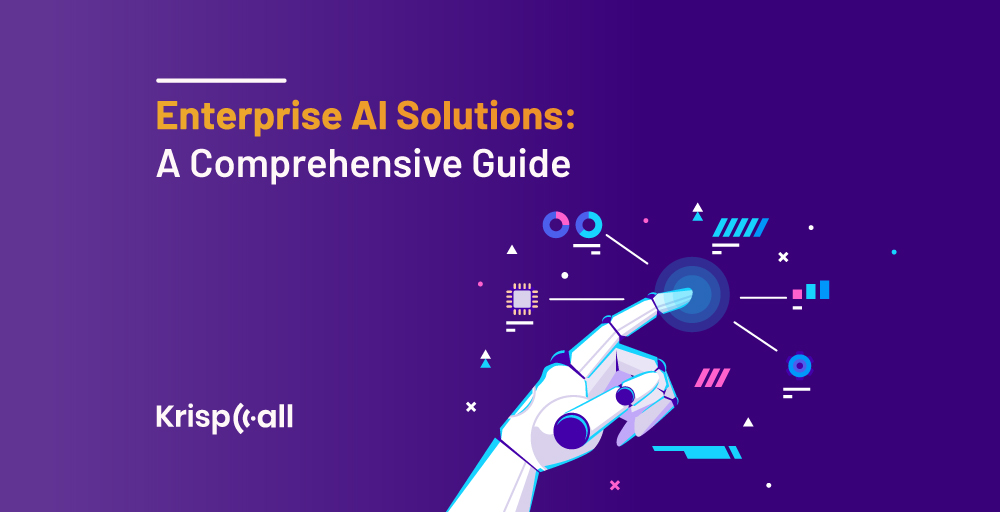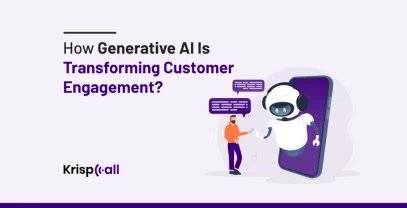Are you looking 👀 for ways to improve your business process to save time, money, and manpower and want to get a competitive edge over others? You are at the right place.
To stay competitive in this ever-evolving digital world, you must optimize your operations and techniques to boost efficiency, profitability, productivity, and decision-making. Various enterprise AI solutions can help you achieve this.
With enterprise AI solutions, you can automate repetitive tasks and process massive amounts of data. It helps understand your needs and provides ways to improve your everyday tasks. 📝
In this blog, you will learn 📖 about the benefits, challenges, implementation strategies, best practices, and case studies related to enterprise AI solutions to improve your processes and operations.
🔐KEY HIGHLIGHTS
- Enterprise AI solutions are AI-based solutions that aim to assist huge companies in improving their everyday process and operations.💫
- AI solutions benefit large organizations with increased productivity, enhanced automation, and improved security.
- Aligning AI with your business strategy, developing a data strategy, building a robust technology infrastructure, adopting responsible AI development, and enhancing employee engagement can be used to build business AI solutions.
- Some use cases are customer service, sales prospecting, recruitment and talent management, financial reporting and accounting, process automation, cloud pricing optimization, and many more.
- To create enterprise-level AI applications, follow a specific 8-step process given in the blog.
What Is An Enterprise AI Solution?
Enterprise AI solutions are AI-based systems that aim to assist huge companies, focusing on improving their operations and processes. They are designed to address the more complicated issues and necessary needs that exist within large businesses.

Business AI solutions are important because of their customizable features that meet different companies unique needs. Additionally, enterprise AI solutions may benefit many businesses, such as manufacturing, retail, healthcare, and finance.
An example of an enterprise AI solution is Mobiry. It is an artificial intelligence solution that helps brands to increase their sales and ROI. Essentially, what makes it work is an AI recommendation engine that automatically observes and informs the marketing unit about prospective buyer behavior.
What Are The Benefits Of Enterprise AI Solutions?
The benefits of enterprise AI solutions are factors that will give an organization a competitive edge over other organizations. Here are some benefits of enterprise AI solutions:
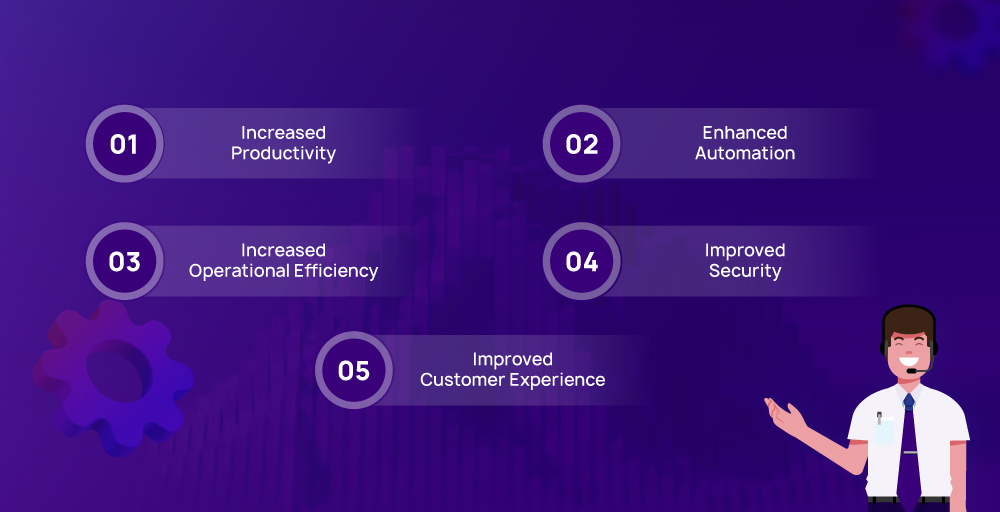
1. Increased Productivity
Businesses can create unique AI assistants to help employees with their daily tasks. The AI assistant can schedule, answer common questions, and flag important information, helping businesses run more smoothly.
These business AI solutions can spot areas where there are bottlenecks or problems and then suggest ways to use more automation and AI tools to improve those workflows and processes. Therefore, this means humans and AI are working hand-in-hand.
2. Enhanced Automation
Businesses can use advanced AI systems to support various departments, such as sales, finance, marketing, HR, customer service, and manufacturing processes.
For example, sales might utilize AI to identify unexplored potential customers automatically. In HR, artificial intelligence may control the recruitment and onboarding of fresh staff.
One big benefit of these AI solutions is their capacity to carry out extremely accurate computations within a short period of time. That allows many companies to operate faster and accomplish more, making them expand and grow significantly.
Also, business AI solutions can take over many repetitive, time-consuming tasks so that human workers can focus on other important things.
3. Increased Operational Efficiency
Companies can use various AI tools to quickly retrieve valuable information and insights from large data sets. They can design and use unique machine-learning algorithms to predict their businesses’ projected growth rate. These algorithms also help them better understand their customers.
AI technologies can instantly examine vast amounts of data. Therefore, businesses are provided with useful information to make informed judgments. Also, AI can discover patterns and trends in data that the human eye could hardly find.
4. Improved Security
Businesses can improve security by adding their own special digital currency or ‘cryptocurrency’ within their app or online marketplace. This will add more security and benefit early app users.
The faster the app or platform attracts more new users, the faster it grows and becomes larger. Cryptography makes its community secure. Similarly, companies can use their own currency to attract attention to their newly created application or web platform and grow quickly.
5. Improved Customer Experience
Businesses can also use AI solutions to improve customer satisfaction. One way to do this is by utilizing chatbots powered by AI. Chatbots are computer programs designed to interact with clients like individuals.
Generally, they are used to solving customers’ queries; however, if they can’t fully solve their issue, they can at least direct the customer to the right person to help.
This helps to improve the customer’s overall experience. Customer’s questions are answered faster, making them more satisfied with the company.
What Are The Steps To Create An AI Solution For Enterprise Use?
To create an AI solution for enterprise use, you need to follow a total of eight steps. These steps will guide you in creating a successful business AI application. The eight steps to create an AI solution are:
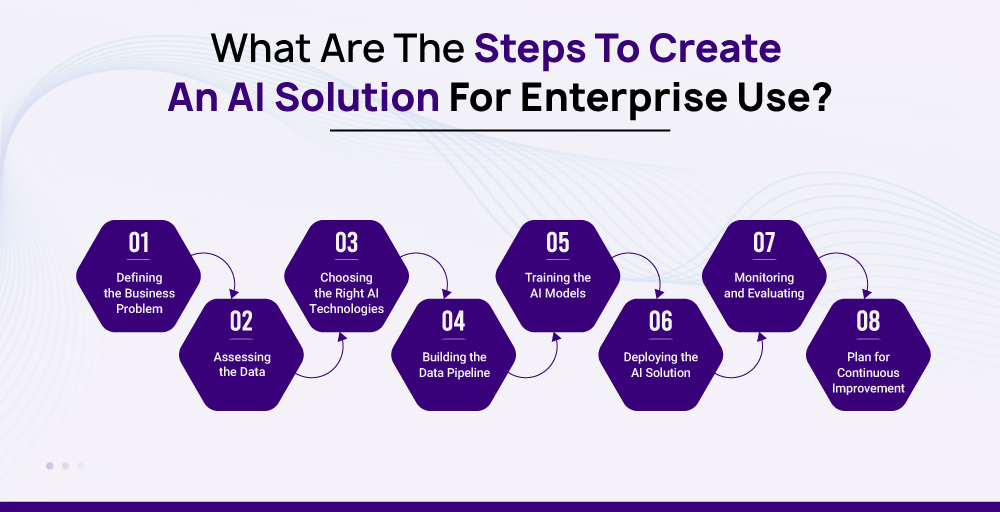
Step 1: Defining The Business Problem
The most important phase when creating a business AI solution is determining which business problem the AI solution will solve. This is a crucial step as it sets the foundation for the entire AI project. The aim is to determine the specific challenges or problems in the organization that can be solved using enterprise AI strategies.
Hence, for companies to grow more effectively, they must identify the problem in various business aspects, such as customer service experience, operations, costs, or revenue generation. This will help companies align their goals and objectives with the AI solution and ensure that the solution remains focused and tailored to the business’s specific needs.
Step 2: Assessing The Data
Gathering and assessing data is really important when building an enterprise-level AI application for a business. The business needs to focus on elements like relevance, structure, quality, quantity, and the process of cleaning and preprocessing the data when collecting and preparing it.
When preparing the data, businesses must only collect relevant data which can solve business problems. The data must also be set up so that AI algorithms can understand and work with it.
This is an important step that ensures the AI receives only accurate information to learn and provide accurate results for a business.
Step 3: Choosing The Right AI Technologies
Since many AI tools are available, it is essential to pick the right AI algorithms and technologies to address particular business AI solutions effectively.
Supervised, reinforcement, unsupervised, and deep learning are examples of many AI technologies; each is best suited for solving specific business problems.
Therefore, it is necessary to decide wisely to choose the right AI technology to solve a particular AI problem. This means looking closely at the algorithm’s strengths and weaknesses before deciding which algorithm/technology to use.
Step 4: Building The Data Pipeline
Building the data pipelines that allow data to flow from its source to the AI models is another essential phase in developing a commercial AI solution.
Choosing the right data sources, storage solutions, and processing steps are just a few of the decisions that must be made while designing an efficient data pipeline.
When designing data pipelines, the key factors to consider are scalability, security, and efficiency. The design of data pipelines must also be aligned with the requirements of the AI models being used and the overall business AI solutions being addressed.
Step 5: Training The AI Models
This step aims to create and refine AI models to resolve business issues precisely. The data pipeline and specific algorithms are used to train these AI models.
Also, the models’ parameters are changed during the training phase to optimize their performance.
After the AI models are created, their effectiveness is assessed by comparing the predicted and actual results.
In this manner, the models’ accuracy and reliability can be evaluated. Thereafter, insights obtained during such evaluation are used to advance and refine more elements of the same AI models.
Step 6: Deploying The AI Solution
Many consider including the AI solution in the existing enterprise systems as the final step in creating an enterprise-level AI solution.
This kind of AI solution aims to ensure that it can run smoothly and add value for the company by working with its current workflows and systems.
At this stage, you must connect the AI solution generated with databases, APIs, or any other enterprise systems to ensure data exchange between the AI solution and the organization’s existing systems and infrastructure.
Additionally, this step is important to check the scalability, reliability, and security-related concerns.
Step 7: Monitoring And Evaluating
Implementing an enterprise AI solution is an ongoing process of monitoring and evaluation. This process involves continually monitoring the AI system’s performance, checking its impact on the business, and modifying it when necessary to suit business needs.
Generally, to monitor how well an AI solution is performing, track things like accuracy, speed, and reliability. Also, assess business outcomes like enhanced performance rates, lower cost, or improved customer satisfaction. Finally, adjust data flow and algorithm if necessary, to fine-tune the solution.
Step 8: Plan For Continuous Improvement
This stage aims to keep the AI solution dynamic and ensure it remains current with changing business demands. Therefore, it is essential for businesses to stay updated with the latest AI technologies and applications so that they can adjust their AI solutions as needed.
The data pipeline, algorithms, existing enterprise systems, and processes will all be updated and refined during this step. By doing so, the AI solution will improve every time and consistently tackle a wide range of changing business requirements.
What Strategies Are Vital For Building A Business AI Solution?
Building an effective strategy for an enterprise AI solution requires several crucial steps. These steps are mentioned below:
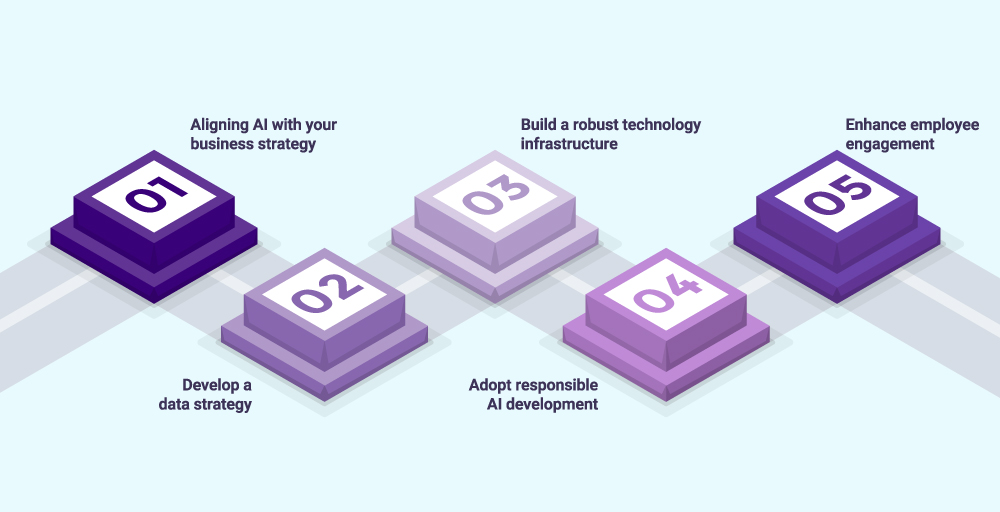
1. Aligning AI With Your Business Strategy
AI should be integrated into the organization to achieve long-term business objectives. First, companies must analyze their present strategies, which will help them know which of today’s AI technologies they can use to fill gaps in their objectives.
After that, identify the exact processes within which AI could create the most value out of other technologies that may also come in handy. Finally, ensure that sufficient instruction is provided to the process that needs to be combined with AI for successful implementation.
2. Develop A Data Strategy
For AI systems to be successful, they require large amounts of data. Thus, it’s necessary for the company to collect, organize, and label the data. Doing this task enables your AI solution to operate effectively and meet your company’s needs.
However, it is possible to leverage AI even without large datasets. The most important thing is to concentrate on high-quality data instead of just having a lot. If you work on enhancing the quality of your current datasets, you might still be able to create AI models that perform well for your business.
3. Build A Robust Technology Infrastructure
An AI system requires a lot of computational power to work properly. This implies that companies must possess relevant technological infrastructure that allows them to create and utilize AI models.
The computational power needed for training large AI models has grown over time. Hence, your company must ensure that it owns appropriate technologies to handle AI’s increasing demands.
4. Adopt Responsible AI Development
Considering ethics when working on powerful and essential AI systems is vital. An AI system that negatively impacts individuals through biased or unfair decisions can be very damaging from a business point of view, as it might lead to a loss of trust. Furthermore, any businesses applying these practices may result in lawsuits.
This is why creators and users of AI should know about ensuring its fairness, being open to its operations, protecting private information, and guaranteeing AI security. These factors are crucial AI responsibilities that an organization needs to follow.
5. Enhance Employee Engagement
When implementing AI, it’s crucial for a company to look beyond just adopting the latest AI trends. They must also focus on integrating AI with their workforce and enhancing enterprise collaboration. This involves acquiring the right AI technologies and ensuring employees have the necessary skills to work effectively alongside AI systems.
The company should prioritize comprehensive training programs to support employees in adapting to AI-driven changes. These programs should aim to upskill employees with new capabilities and guide them in redefining how tasks are accomplished to leverage AI’s capabilities optimally.
Additionally, updating company policies and enhancing information-sharing practices can foster a collaborative environment that facilitates seamless integration between humans and AI technologies.
What Are The Use Cases For Enterprise AI Solutions?
Some use cases for enterprise AI solutions are:
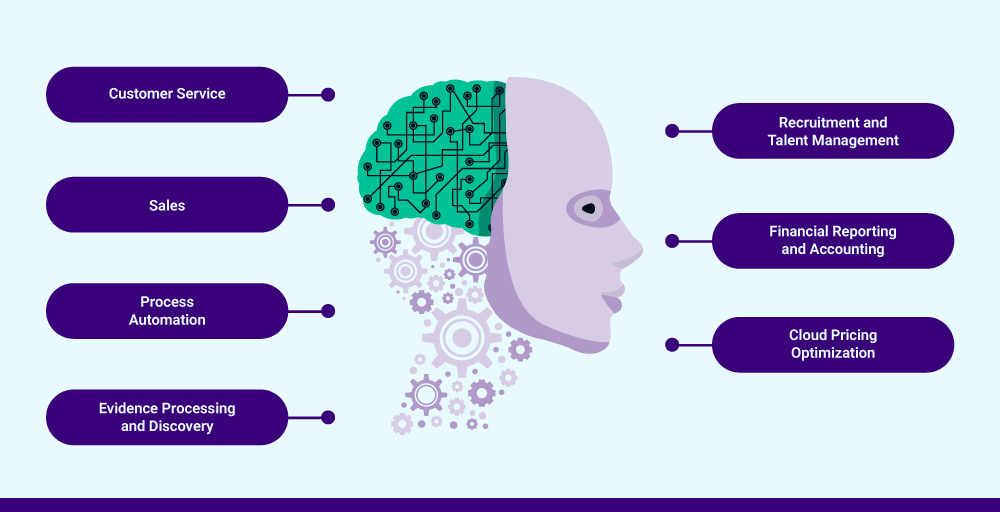
1. Customer Service
Companies are using AI extensively in their customer service these days. This is because AI can help ensure customers get the help and support they need. Customers are now expecting really fast and efficient customer service. Around 67% of millennials want customer service right away, in real-time.
In the case of Lufthansa Airlines, they had a lot of problems during the COVID-19 pandemic. With so many flights being canceled or changed, their customer service phone lines were completely overwhelmed with customers trying to get help. This made the company use AI solutions for customer service.
2. Sales Prospecting
Businesses use AI to conduct sales and find new customers. AI uses data and algorithms to determine which customers are most likely to buy products or services from a particular company. As a result, sales teams can concentrate more on people who are more likely to buy something.
For example, consider a cybersecurity firm that uses artificial intelligence (AI) for sales leads. This AI aims to determine who among many potential customers will likely purchase their security software. AI generates the result and presents this information to the sales team, giving them notes about those potential leads.
3. Recruitment And Talent Management
Amazon is among those companies using AI in their hiring processes to review resumes and identify potential matches for various job classifications. Moreover, recruiters carry out online evaluations of those they consider the best.
This AI tool enables Amazon to go through all the resumes and applications quickly because it can perform much of the preliminary sorting and selecting. This enables companies to find the most suitable applicants for various positions quickly. Many other firms, like Amazon, are starting to use artificial intelligence in talent recruitment.
4. Financial Reporting And Accounting
Intuit has developed a unique AI system named GenOS to analyze large financial data sets more efficiently. With this system, repetitive and error-prone financial tasks, like categorizing transactions or processing invoices, are done by AI. This will help improve the process of analyzing customers’ financial information.
PricewaterhouseCoopers (PwC) is also using AI in many similar ways to Intuit. They use different types of AI solutions, such as natural language processing, machine learning, deep learning, and more, to help improve their reporting services.
5. Process Automation
AI has shown that it can be really good at automatically doing certain time-consuming tasks that people sometimes make mistakes on. For example, the Atlantic Health System uses AI-powered process automation to get prior approvals from insurance companies much faster and more efficiently.
In the case of Johnson & Johnson, they are using robotic process automation (RPA), machine learning (ML), and AI to find complicated processes involving multiple departments. Then, they use these technologies to handle those complex, cross-departmental processes automatically.
6. Cloud Pricing Optimization
Companies are turning to AI to find ways to run their applications and services that rely on the cloud more efficiently and at a reduced cost. For example, Dropbox uses AI to reduce its costs of using Amazon’s cloud services. By using AI, Dropbox brought down its costs and saved almost $75 million.
Another example is Airbnb, which uses AI to set the best service prices on Amazon’s cloud platform. It also uses AI to manage the computing power and storage it needs to build custom tools to track its cloud costs.
Wrapping Up
Building AI solutions for large organizations may appear quite a tough task. However, if you implement it, you will get various benefits to improve your operations. But first, you have to define your problem and choose the right AI solution.💫
When building, you must ensure that reliable and large amounts of data are present to train the AI. In addition, you need to establish the right systems to get the data flowing through the AI, and finally, you need to monitor and evaluate the AI solution.
Using advanced AI systems for enterprises gives you a competitive advantage over other organizations. With an enterprise AI strategy, you can streamline your processes, increase your productivity, improve customer experience, and shorten your sales cycles.🌟
FAQs
What is enterprise AI?
Enterprise AI is the application of artificial intelligence (AI) technologies within large organizations or enterprises to enhance business processes, decision-making, and customer interactions. It uses AI algorithms, machine learning models, natural language processing (NLP), deep learning, and other advanced analytics tools to automate tasks, analyze data, and improve efficiency and productivity.
What are the things to consider when building an enterprise AI application?
The things to consider when building an enterprise AI application are unifying all data, multi-cloud deployment, providing edge deployment options, multi-format data, and many more.
What are the components of an enterprise AI solution?
The components of an enterprise AI solution are data infrastructure, machine learning models and algorithms, integration with existing IT infrastructure, data security, data privacy, user interface and experience, and many more.
What challenges are commonly faced when implementing enterprise AI solutions?
Data privacy concerns, complex implementation processes, integration with existing systems, and a lack of skilled workers are among the challenges commonly faced when implementing enterprise AI solutions.
What considerations should businesses consider when selecting an enterprise AI solution provider?
Security and compliance, scalability and flexibility, transparency, and alignment with business objectives are some factors a business should consider when selecting an Enterprise AI Solution provider.

